The Travelers
Luis Alfaro
Magic Theatre, in Co-Production with Campo Santo
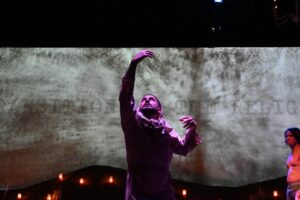
A parable. An allegory. A dream. A mind-bending, fascinating fable.
Any and all of these descriptors are possibilities to describe Luis Alfaro’s newest, stage creation, The Travelers, now in a gripping world premiere by Magic Theatre and Campo Santo – a co-production both ethereal and earthy, disturbing and funny, foreign and familiar. Which categorical term that best describes The Travelers depends on one’s thought-provoking aftermath. There are many, equally plausible interpretations what it all means; and each is a mind trip well worth taking.
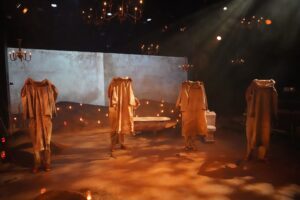
Four Latino men gather silently, meditatively in a circle to rid themselves of their street clothes and to don plain, hooded cassocks; a fifth undresses and enters a rusty, legged bathtub. Brothers of the Catholic Church’s ancient Order of the Carthusians founded in 1084, they meagerly exist together in the dry, cracked earth of their Central Valley of California in the town of Grangeville, population 468, spending much of their community time serving several local prisons and living a spartan life of prayer, singing, and meditation.
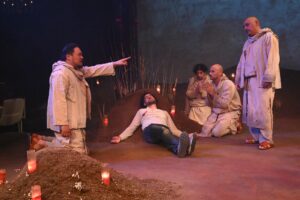
As their ritual ends, there is sudden, shattering scream from just outside, followed by a man stumbling in with much blood staining his shirt. He immediately collapses into their collective arms as they lie him on a mound of red earth, his arms outstretched as if on a cross. When one brother asks, “How did he end up here?” another answers, “How did any of us end up here?” Later, when the wounded one has recovered, he inquires, “I want to know how I got here. And why am I here?” A brother responds to the second entreaty, “That’s the better question.”
And as we witness the introduction and eventual integration of this man who arrives with wild-looking eyes of fright, with hair disheveled on a half-shorn scalp, and with a voice gruff and raspy, we begin to realize that each of our own answers as to ‘why’ Brother Juan is now the sixth member of this order of misfit brothers is key to our each deciding if what we are witnessing is parable, allegory, dream, or something else.
Like Brother Juan, each of the brothers once arrived wounded in some way. One was left there at birth; one, abandoned by his family as a boy of ten. One found himself bankrupt from a former life as a circus entrepreneur in Mexico. Another came to rid himself of anger originating from his resentment of the back-breaking farm work his mother had to endure while the fifth sought the religious order as a kind of sanatorium due to rejection by others because of what they saw as his being over-reacting, over-emotional, over-obsessive.
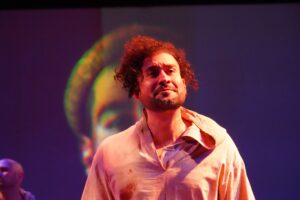
Into this group, Brother Juan arrives and is quickly told his job is to “fix things” because “there is a lot to fix here.” While his first assignment is to install an electrical outlet in a place where there is none, it soon becomes evident that bullet-pierced Brother Juan’s fixing is to include more than just broken wiring or crumbling stucco.
The longest resident and thus the self-proclaimed leader of this small collection is Brother Brian (Brian Rivera), a mixture of teacher, counselor, evangelist, and boss who seems to understand that Brother Juan’s arrival is more than just coincidence. Wheb other brothers want to send the bleeding body to the hospital, Brother Rivera reminds them that “every visitor brings with them a possibility.”
It is Brother Brian who soon assigns the role of ‘fixer’ to the newcomer. Later when the new Brother Juan (Juan Amador) tells his life story to Brother Brian and explains he has always been on the move, Brother Brian responds prophetically and pointedly, “We are all travelers … Our journey takes place inside.”
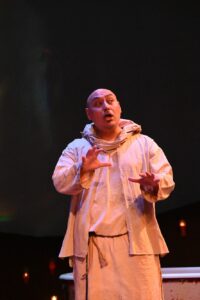
The other travelers of this religious clan of sorts include Brother Yiyo (Guillermo “Yiyo” Ornelas), a fidgety, perpetually nervous, and jumpy worrier who speaks in a high, often squeaky voice but who is clearly looking to appease and to help those around him. Brother Danny (Daniel Duque-Estrada), a former clown on a horse playing a guitar in his native Mexico, often carries a quick smile and a good heart in relation to the others and explains that “my whole life has been to make other people feel good.” Quite opposite in character – at least at first meeting – is Brother Nancho (Kinan Valdez), a grouchy, grumbling frowner who is quick to admit, “I’m angry,” with his fury often directed toward a Catholic hierarchy that is treating the Church more like a business and at a local archdiocese that is threatening to defund this remote group of monks. When a brother asks how long will the surprise arrival be with them, Brother Nancho growls, “We have all been here long enough.”
But the Brother that the newly arrived Juan finds most inexplainable yet intriguing is Brother Ogie (Ogie Zulueta) who has resided full-time since babyhood in the group’s only bathtub. With legs that reportedly cannot walk for some unknown reason, he originally was put there as a compromise between older brothers who did not want to keep the abandoned baby and a then, much-younger Brother Brian who felt compassion for him. Ogie tells the astonished Juan that after living many years in the watery tub, the bathroom is where he prefers to be and that actually a lot happens there since all the brothers must in essence visit him daily when they sit on the nearby toilet (the only one they have).
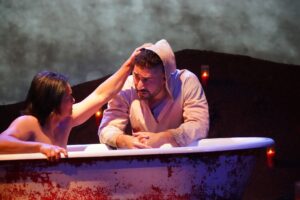
Brothers Juan and Ogie soon develop their own, special relationship, one that allows the former to open up more about his past and to encourage his new friend to think beyond his role as just the local, tub resident. In fact, with Brother Juan’s encouragement, Brother Ogie’s bathroom residence soon becomes a kind of confessional for all the brothers, with his taking on the role of a bestower of sought and needed spiritual forgiveness by these men who are each carrying a lifetime of various regrets and inner sufferings.
Amidst periods of processional, prayerful chants; of singing of songs with a ‘70s folk flavoring, and of group sharing where subjects like ‘my favorite saint’ is the focus, we watch tension collectively increase among the group as the fate of the group’s continued existence becomes more unsure. Evident too is a growing sense that the personal, life journeys each of these people has internally travelled for varying numbers of years are each and all in the ready for some sort of transformation. And as the others become more questioning and even uneasy with their present states and their lives in this local order, Brother Juan transforms into someone quite unrecognizable from the half-crazed, half-dead Juan who arrived only a short time prior.
Each of these cast members is exceptional in portraying characters who easily could be written off as too strange and unusual to be believable. Each displays a genuineness that is visceral, even when individual circumstances and background stories are quite fantastical. Catherine Castellanos deftly and sensitively directs the flow of movements and transitions, sets of interactions and confrontations, and moments of quiet pause and meditation to result in a story both grounded in the stark realities of Latino life in remote, central California and one lifted into symbolic realms where characters represent individually and/or collectively themes, situations, and issues of our current, troubled world.
With projected titles like “Catechism” and “Rapture” suggesting heavy, religious overtones, it is plausible to conclude that Luis Alfaro has created a parable of sorts, where the stages of transgression, repentance, forgiveness, and resurrection can be overlayed to the story and where certain characters can take on archetypal roles of a biblical sense. On the other hand, when an uninvited arrival crosses the border into a closed-set community, there is a possibility that we are experiencing an allegory of the arriving immigrant integrating into a new, quite foreign land. And with its fantastical elements – greatly increased through the surrounding projections of Joan Osato that range from a beating heart to peering animals’ eyes to mountain lions on the prowl – maybe we are watching one man’s transformative dream where healing occurs as he sleeps through the help of a collection of imagined encounters.
The uncanny power of Luis Alfaro’s script is that it lends itself to these and probably many other interpretations, all based on the current conditions of Latinos in California and their relation to the U.S. government, institutions like the Catholic Church and its dogma in their lives, and to personal histories too often shattered due to past and present trauma. The Travelers is a journey that its audience members cannot help but continue to traverse once leaving the theatre through follow-up individual mulling, conversations with others, and/or (like in my case) a full night of dreaming where scenes replay, each time with a slightly different emphasis and possible meaning.
As for me, I cannot help but overlay my moving experience of Magic Theatre and Campo Santo’s world premiere production of The Travelers with the words written by Stephen Schwartz for Alan Menken’s song, “God Help the Outcasts:”
“God help the outcasts, hungry from birth,
Show them the mercy they don’t find on earth.
The lost and forgotten, they look to you still,
God help the outcasts,
Or nobody will.”
Rating: 4.5 E
A Theatre Eddys Best Bet Production
The Travelers continues through March 5, 2023 in world-premiere co-production by Magic Theatre and Campo Santo at the main stage of Magic Theatre, Fort Mason Center for Arts & Culture, 2 Marina Boulevard, Landmark Building D, 3rdFloor, San Francisco. Tickets are available online at https://magictheatre.org , by email at boxoffice@magictheatre.org, or by phone at 415-441-8822.
Please note: Proof of boostered, COVID vaccination is required of all patrons as well as the wearing of masks during the performance.
Photo Credits: Jay Yamada
